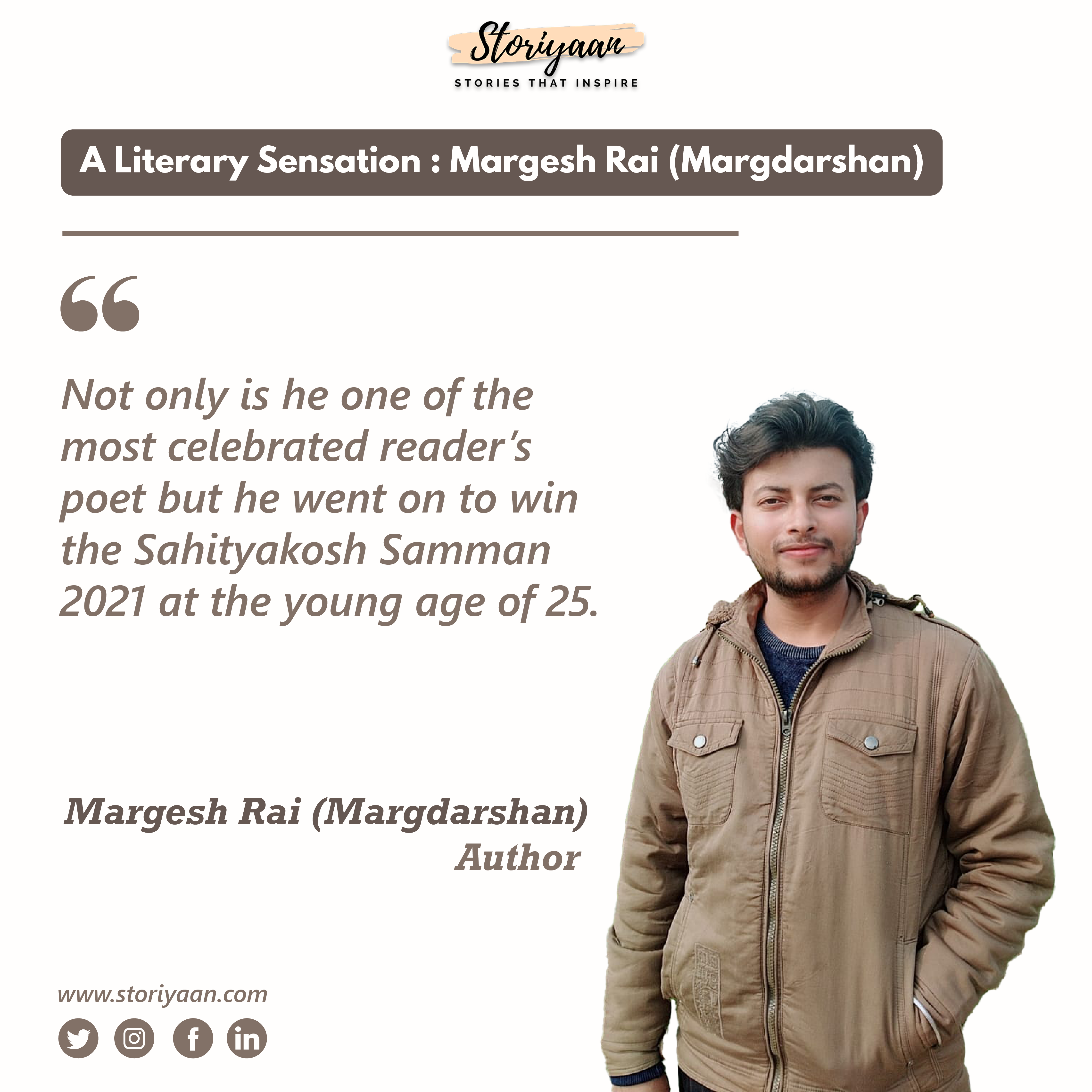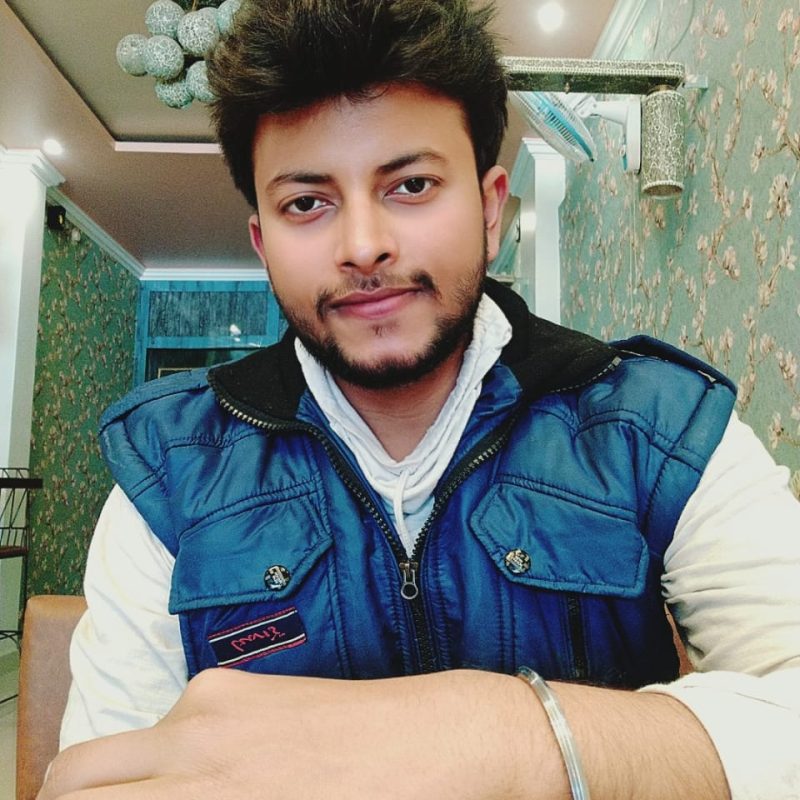“If I feel physically as if the top of my head were taken off, I know that is poetry” – Emily Dickinson
This ambiguous expression perfectly captures the poetry of Margesh Rai (Margdarshan), a poet traversing the world in the rhythm of poems. A true poetry lover, Margesh has published bestselling books both in Hindi and English. His works are a culmination of his ingenious creativity and immersive experiences. Besides, Margesh Rai (Margdarshan) was awarded the Sahityakosh Samman 2021 for his phenomenal contribution to literature, all at the young age of 25. Additionally, he is a reader’s poet and has a dedicated audience who awaits his next book patiently.
Read along to witness a writer’s mind and journey in this enveloping conversation with Storiyaan.

Margesh Rai (Margdarshan): A Literary Sensation
Interview
Questions and answers
You come from a city with an exquisite creative history. How big an influence did that ambience and traditional history have on your psyche?
I grew up reading the great literary works of renowned figures such as Munshi Premchand, Tulsidas, Dushyant Kumar, and many other literary legends. I admire the glorious creative history of Varanasi and its traditional history. However, my psyche and thought process has remained unique, which is reflected in my work.
The best part of your poetry is the way you draw inspiration for life from the stillness of nature. In what way has this proximity with nature been influential in shaping your perspective of the world?
I immerse myself completely in the realm of nature to gain insights for creating a different universe of my poetry where I take my readers along with me, and together, we enjoy a joyous ride. Nature soothes my soul and encourages me to bring out the best version of myself on paper. Thus, truly, nature has been a constant companion in my literary journey.
“Poetry: A garland of words” has been dedicated to your father. Can you tell us about his influence on your development as a poet, and what was the biggest lesson that you took back from him?
My father was my supporter and the ideal of my life. My father wished to see me become an author. Unfortunately, he passed away last year before my debut, but I have his blessing with me nonetheless. The biggest lesson that I took back from him is that you should keep working hard and maintain your patience level.
Tell us about the time when you were presented with Sahityakosh Samman 2021 and how did it motivate your future projects?
I felt inspired, motivated, and I was on cloud nine. After receiving Sahityakosh Samman 2021, I started working on my upcoming projects with the hope that this time I will be uplifting the level of my work. Hence, it has been a defining stage to be honored and recognised.
We heard that you are all set to launch your upcoming book, Khushboo Bikherti Pagdandiyan- Part 2. Tell us something more about it?
Yes, you heard it right. I’m working on Khushboo Bikherti Pagdandiyan-2. It will encompass poems on nature, love, patriotism, spirituality, and humour. Therefore, Khushboo Bikherti Pagdandiyan- 2 will explore different colours of my creativity and give a glimpse into my art and how it defines me.
What is your strategy of dealing with negative criticisms, and how does that affect your writing?
Fortunately, I have never faced negative criticism for my work. However, in the future, if I face criticism, I will try to bring improvement to my work. Besides, constructive criticism is always welcome and appreciated.
What kinds of roles do you believe independent literary journals play in the greater literary ecosystem?
Independent journals—and organizations, presses, reading series, etc.—are indispensable, stimulating sites of possibility. In the current scenario, most writers and readers have embraced online literary magazines as a great step in the progression of independent literary journals, and rightly so.
What are some of the major changes that you have noticed in the present age of poetry?
The present age of poetry is lopsided towards love, breakup, pain, and other similar human emotions. Consequently, today’s poetry is social-media centric, more attributable to content than poetry. I still prefer to read evergreen works of poets such as Dushyant Kumar, Kaka Hathrasi, William Wordsworth, and others.
Do you think that marketing is the pillar that ensures the book's success in the current times?
No, there is no such fool-proof formula that can ensure success. However, marketing is important in the current scenario as your book will fail to reach the readers without strategic marketing. It won’t guarantee success, but once it’s out in the market, your fate lies in the hands of your readers.
What would be your message to the budding writers out there and a lesson that you have learnt through your journey?
My advice will be to keep on writing and read some great books to enhance your knowledge of diverse subjects. I have learnt that writing with a consistent approach helps a writer grow. Additionally, I write what I feel without worrying much about the response, and that has helped me immensely.
Quick 5
1. Your idea of a creative block in one line – Do nothing, relax and wait for the creativity to set in
2. Favourite authors – William Blake, Ruskin Bond, and Dushyant Kumar
3. One reason to choose poetry over prose – Poetry lends me the literary freedom to express myself and take my readers to a different universe.
4. Romantics or postmodernists – Romantics
5. Describe your tryst with nature in one word – Happenstance

